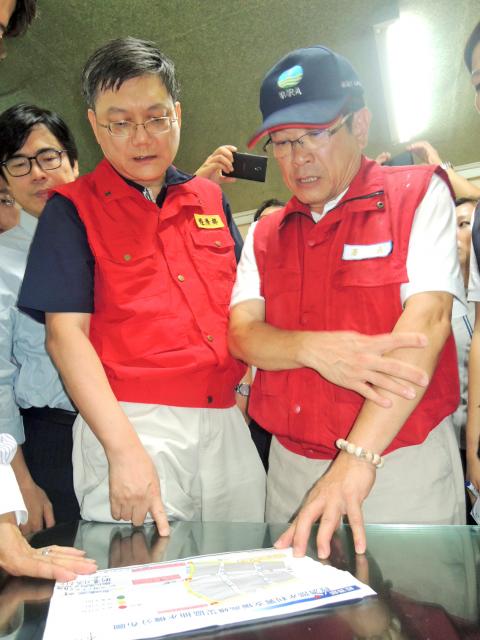Premier Jiang Yi-huah (江宜樺) yesterday accepted Minister of Economic Affairs Chang Chia-juch’s (張家祝) resignation after repeated efforts to dissuade Chang from quitting.
Jiang has appointed Deputy Minister of Economic Affairs Woody Duh (杜紫軍), who had also offered to resign, to replace Chang.
Chang is the highest-ranking official to have quit in the wake of a series of gas pipeline explosions in Greater Kaohsiung on July 31 and Aug. 1 that killed 30 people and injured 310. The explosions are believed to have been caused by a leaking underground pipe carrying propene.

Photo: Hung Ting-hung, Taipei Times
President Ma Ying-jeou (馬英九) expressed regret over Chang’s resignation, but said he respected the decision.
Ma also acknowledged Chang’s contribution to the government’s achievements, such as its economic cooperation agreements with Singapore and New Zealand and a service trade pact with China, Presidential Office spokeswoman Ma Wei-kuo (馬瑋國) said.
Chang, 64, tendered his resignation last week amid finger-pointing over the pipeline blasts.
Critics have blamed the Ministry of Economic Affairs (MOEA), saying its oversight of petrochemical companies has been poor.
In a public statement issued on Thursday, Chang expressed frustration over the legislative process, which he said has been hampered by the opposition’s efforts to block important economic projects. This puts the nation’s future in jeopardy, Chang said.
Since becoming economics minister in February last year, Chang took on a number of thorny issues, including massive public opposition to government efforts to complete the Fourth Nuclear Power Plant and to a service trade agreement with China.
The government eventually bent under the pressure of huge public protests against the agreement in March and April, putting the pact on hold, and has shelved the nearly completed plant in New Taipei City’s Gongliao District (貢寮).
Commenting on Duh’s appointment, National Taiwan University economics professor Kenneth Lin (林向愷) had reservations about the new arrangement.
“I do not think the appointment will help improve the economy and save lives,” Lin said. “The core problem is that the government has totally lost its direction. It cannot come up with effective policies, or measures that can help solve the serious problems faced by the people and industries.”
Those problems include stagnant wages, slow industrial improvements, the migration of advanced technologies and a widening wealth gap, Lin said.
Taiwan Institute of Economic Research (台灣經濟研究院) director Gordon Sun (孫明德) said he has no doubt that Duh is a well-trained professional and will have no problem instituting the government’s existing polices, judging from his long experience at the ministry.
However, Sun said Duh’s top priority now should be improving the ministry’s communication with lawmakers and the public if the ministry wants to push through its industrial polices.
The ministry’s key policies, such as striking a service trade deal with China, have met strong resistance from opposition lawmakers and the general public primarily because of poor communication, Sun said.
Additional reporting by Lisa Wang

CHAOS: Iranians took to the streets playing celebratory music after reports of Khamenei’s death on Saturday, while mourners also gathered in Tehran yesterday Iranian Supreme Leader Ayatollah Ali Khamenei was killed in a major attack on Iran launched by Israel and the US, throwing the future of the Islamic republic into doubt and raising the risk of regional instability. Iranian state television and the state-run IRNA news agency announced the 86-year-old’s death early yesterday. US President Donald Trump said it gave Iranians their “greatest chance” to “take back” their country. The announcements came after a joint US and Israeli aerial bombardment that targeted Iranian military and governmental sites. Trump said the “heavy and pinpoint bombing” would continue through the week or as long

TRUST: The KMT said it respected the US’ timing and considerations, and hoped it would continue to honor its commitments to helping Taiwan bolster its defenses and deterrence US President Donald Trump is delaying a multibillion-dollar arms sale to Taiwan to ensure his visit to Beijing is successful, a New York Times report said. The weapons sales package has stalled in the US Department of State, the report said, citing US officials it did not identify. The White House has told agencies not to push forward ahead of Trump’s meeting with Chinese President Xi Jinping (習近平), it said. The two last month held a phone call to discuss trade and geopolitical flashpoints ahead of the summit. Xi raised the Taiwan issue and urged the US to handle arms sales to

State-run CPC Corp, Taiwan (CPC, 台灣中油) yesterday said that it had confirmed on Saturday night with its liquefied natural gas (LNG) and crude oil suppliers that shipments are proceeding as scheduled and that domestic supplies remain unaffected. The CPC yesterday announced the gasoline and diesel prices will rise by NT$0.2 and NT$0.4 per liter, respectively, starting Monday, citing Middle East tensions and blizzards in the eastern United States. CPC also iterated it has been reducing the proportion of crude oil imports from the Middle East and diversifying its supply sources in the past few years in response to geopolitical risks, expanding

Pro-democracy media tycoon Jimmy Lai’s (黎智英) fraud conviction and prison sentence were yesterday overturned by a Hong Kong court, in a surprise legal decision that comes soon after Lai was jailed for 20 years on a separate national security charge. Judges Jeremy Poon (潘兆初), Anthea Pang (彭寶琴) and Derek Pang (彭偉昌) said in the judgement that they allowed the appeal from Lai, and another defendant in the case, to proceed, as a lower court judge had “erred.” “The Court of Appeal gave them leave to appeal against their conviction, allowed their appeals, quashed the convictions and set aside the sentences,” the judges